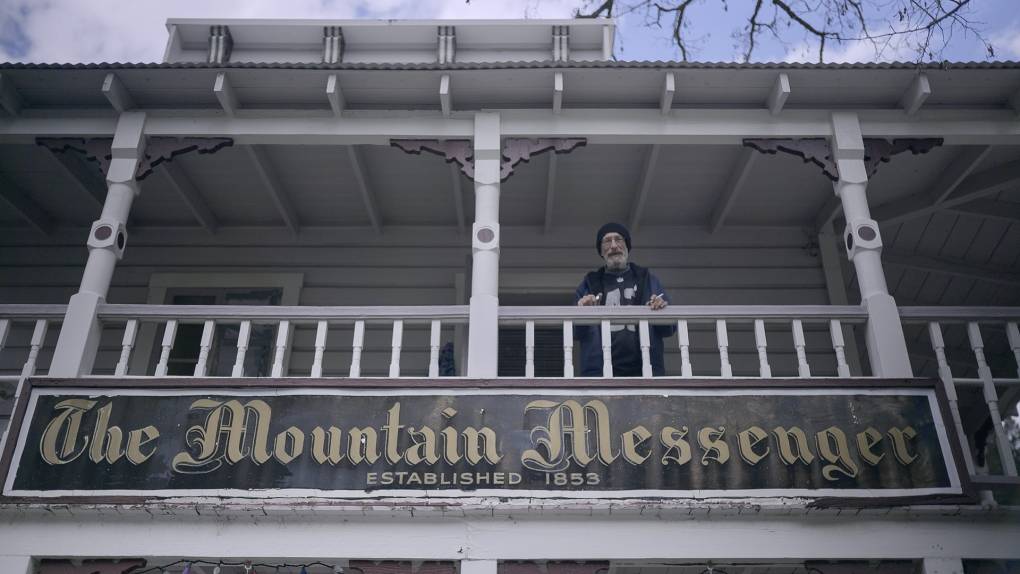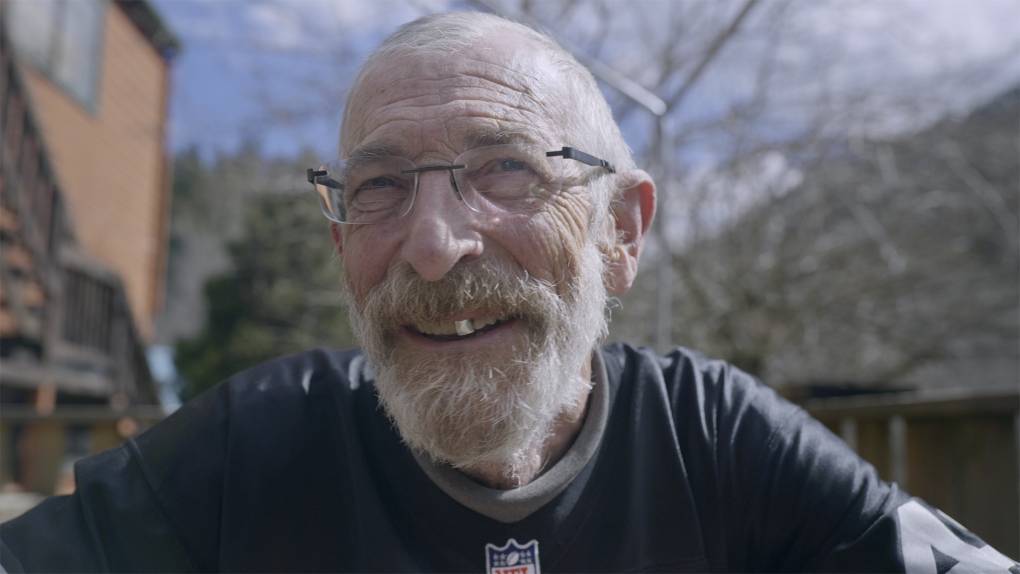How California’s Oldest Weekly Newspaper Covers COVID-19

The Mountain Messenger is California’s oldest weekly newspaper. (Photo Goran Zaneti)
May 9, 2020
The Mountain Messenger is California’s oldest running weekly newspaper — it’s been around since 1853 and Mark Twain was an early contributor. The newspaper has become a lifeline for people in Downieville, a remote community where local news about the coronavirus is hard to find.
Downieville is a quaint historic town in a canyon, surrounded by forests. It’s at the confluence of the Downie River and the North Fork of the Yuba River. While Downieville’s legacy is gold mining, today it relies mostly on tourism for economic survival. The population is older, there’s no hospital for miles and the internet service is spotty.
You could also say that the “Mountain Messenger” himself is Carl Butz, the paper’s new owner, who stepped in to keep the presses running earlier this year when the former owner was ready to retire.
Butz is 71. He’s tall and lanky. He chain-smokes. He’s got a gold front tooth and smiles easily. He says a local newspaper helps keep a community thriving.
“If you don’t have a newspaper, your identity goes away. It isolates you to not have some common ground that everybody knows about,” said Butz.

Carl Butz, The Mountain Messenger’s new owner, stepped in to keep the presses running earlier this year when the former owner was ready to retire. (Photo Goran Zaneti)
Covering Coronavirus
Butz says part of what he’s doing at The Mountain Messenger is what he calls “scrapbook journalism.” People want to see photographs of themselves and of people they know in the paper. As the editor, he covers everything from county board meetings and legal notices to local poetry contests and chili cook-offs. He also writes about the history and culture of the town.
His staff is tiny — it’s just Butz and a part-time office manager. But he’s rich in local volunteers who are working hard to keep the paper alive. He said he encourages people to send in their own stories.
“We shouldn’t let this writing business be taken over by professionals,” Butz said.
The paper’s contributors include a pair of college grads who are helping him lay out the paper and a sixth grader who is transcribing oral histories of Butz’s great-uncle, Chester, a local legend. He’s also printing serialized chapters of a memoir by a 90-year-old man who spent a summer here in 1948 with his buddies and a Ford Model A.
In Sierra County, readers rely on The Mountain Messenger as a primary source of local news. Lately, Butz has also written pieces on unemployment and tracked COVID-19 cases in neighboring counties.
At last check, there have been no confirmed cases of the coronavirus locally. But residents are worried. The closest hospital is at least an hour’s drive away. They hope tourists stay home.
“There’s all kinds of talk about all these people coming up here bringing the virus with them,” Butz said. “I mean, there are people up here who would like to have us stop people at the county line. I mean, it’s really ironic that this county lives off of people coming to visit. You know, our only export is the beauty we’ve got.”
Saving the Paper
The COVID-19 crisis has been the death knell of already struggling newspapers and weeklies across the country, as advertisers and other funding sources drop off.
The Mountain Messenger almost met the same fate.
Don Russell, the paper’s former owner, put the paper up for sale last year after running it for nearly 30 years. There weren’t many bites, and most people thought it was the end of the paper’s long streak.
“Don Russell, the old editor, thought I was absolutely bonkers to even consider buying the paper,” said Butz. “I know he didn’t make much money on the damn thing over the years.”
Butz is a retired computer programmer and a labor economist for the state. He receives Social Security benefits, so he said he didn’t need the paper to earn him a paycheck. “When it got down to it, I just couldn’t stomach the idea of it not continuing,” he said.
Most days Butz works out of the newsroom, with a cup of coffee in hand and a cigarette at the ready, typing out headlines in the cluttered newspaper office. Unless it’s Thursday. Thursday is printing day at the press, which is in Quincy, a 90-minute drive from Downieville.
Once in Quincy, Butz picks up the paper from the press and packs the stacks in his Subaru, setting off across Sierra County. Butz is also the paper’s deliveryman. He drives from Quincy to Grass Valley, stopping in post offices and gas stations in between, filling newspaper stands with the week’s edition and collecting coins from its sales.
After he saved the paper, the story received national press and his subscriber numbers went up. He sells about 300 papers a week in newsstands across the county, but he’s got nearly 800 subscribers across 36 states.
Butz lives in a rustic off-grid cabin on the side of a mountain. He’s got no cell service or internet. His daughter lives out of town and worries about him. In late March, he was snowed in for several days and eventually rescued by the town snowplow.
At her urging, Butz moved into the newsroom. He brought in a futon and set up a makeshift kitchen in the old darkroom. He plugged in a coffee maker and prepares soft-boiled eggs in an electric kettle.
“I like it, actually. No commute. I’m here to work,” he said. “There’s always work to do on the newspaper.”
In the first issue after he took over the paper, Butz wrote about the times in his life that newspapers have been with him.
“Newspapers have affirmed my existence time and time again. Keeping this paper alive is maintaining a love affair,” he wrote.
Butz says, in some ways, keeping the paper going was like a protest, a fight against losing the essential things. Now, he continues to provide essential coverage for his community during the coronavirus crisis.
“There’s a certain amount of rebellion that’s involved in what I’ve done. It’s like, ‘God damm it, no!’ If I have a chance to make a difference in this I’m going to do it,” Butz said. “We’ll see how long I last. But so far, so good.”



